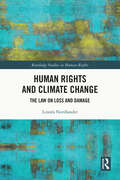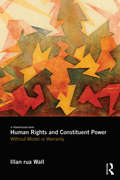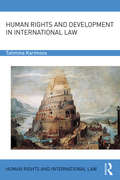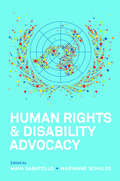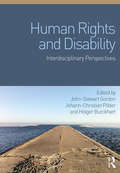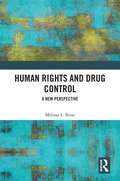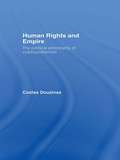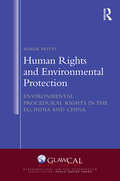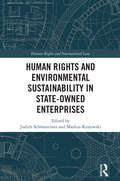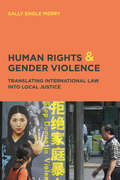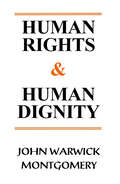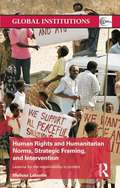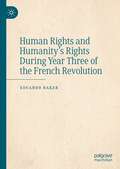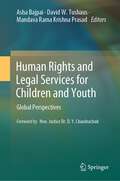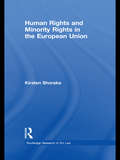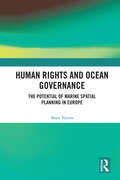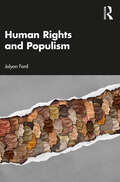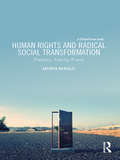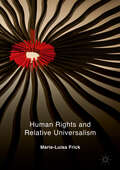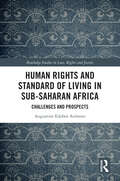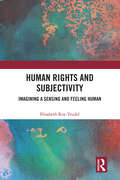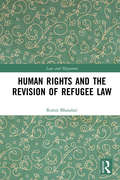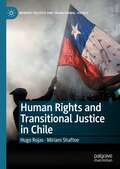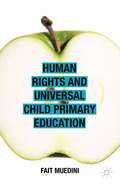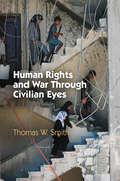- Table View
- List View
Human Rights and Climate Change: The Law on Loss and Damage (Routledge Studies in Human Rights)
by Linnéa NordlanderThis insightful and timely book examines the intersection of international climate change law and international human rights law with respect to loss and damage from climate change. Bringing together these two areas of the law, the volume reframes the debate on loss and damage law and offers the first systematic analysis of the legal consequences of Article 8 of the 2015 Paris Agreement, both independently and in light of the concurrent applicability of human rights law to climate change harms. The author outlines the legal implications of Article 8 and the extent to which the application of a human rights perspective can contribute to the interpretation and development of those implications. Accessible and engaging, this book has important implications for both legal doctrine and policy development at the international level. This book is a valuable resource for scholars, students, and practitioners in human rights, human rights law, climate change law, and international environment law.
Human Rights and Constituent Power: Without Model or Warranty
by Illan rua WallWith the emergence of modern human rights in the Universal Declaration, what remained of a radical political potential of the discourse withdrew: statism and individualism became its authorised foundations and the possibilities of other human rights traditions were denied. The strife that once lay at the heart of human rights was forgotten in an increasing juridification. This book seeks to recover the radical political pole of human rights. It looks to the debates surrounding constituent power – the ‘power of the people’ – in order to understand different possibilities for the discourse. Using continental political philosophy and critical legal theory, Human Rights and Constituent Power presents a very different conception of human rights, more at home on the riotous streets than in courtrooms and parliaments.
Human Rights and Development in International Law (Human Rights and International Law)
by Tahmina KarimovaThis book addresses the legal issues raised by the interaction between human rights and development in contemporary international law. In particular, it charts the parameters of international law that states have to take into account in order to protect human rights in the process of development. In doing so, it departs from traditional analyses, where human rights are mainly considered as a political dimension of development. Rather, the book suggests focusing on human rights as a system of international norms establishing minimum standards of protection of individuals and minimum standards applicable in all circumstances on what is essential for a dignified existence. The various dimensions covered in the book include: the discourse on human rights and development interrelationship, particularly opinio juris and the practice of states on the question; the notion of international assistance and cooperation in human rights law, under legal regimes such as international humanitarian law, and emerging rules in the area of protection of persons in the event of disasters; the extraterritorial scope of economic, social and cultural rights treaties; and legal principles on the respect for human rights in externally designed and planned development activities. Analysis of these topics sheds light on the question of whether international law as it stands today addresses most of the issues concerning the protection of human rights in the development process.
Human Rights and Disability Advocacy (Pennsylvania Studies in Human Rights)
by Maya Sabatello Marianne SchulzeThe United Nations adoption of the Convention on the Rights of Persons with Disabilities (CRPD) constituted a paradigm shift in attitudes and approaches to disability rights, marking the first time in law-making history that persons with disabilities participated as civil society representatives and contributed to the drafting of an international treaty. On the way, they brought a new kind of diplomacy forward: empowering nongovernmental stakeholders, including persons with disabilities, within human rights discourse. This landmark treaty provides an opportunity to consider what it means to involve members of a global civil society in UN-level negotiations.Human Rights and Disability Advocacy brings together perspectives from individual representatives of the Disabled People's Organizations (DPOs), nongovernmental organizations (NGOs), indigenous peoples' organizations, states, and national institutions that played leading roles in the Convention's drafting process. The contributors provide vivid and personal accounts of the paths to victory, including stumbling blocks—not all of which were overcome—and offer a unique look into the politics of civil society organizations both from within and in its interaction with governments. Each essay describes the nonnegotiable key issues for which they advocated; the extent of success in reaching their goals; and insights into the limitations they faced. Through the plurality of voices and insider perspectives, Human Rights and Disability Advocacy presents fresh perspectives on the shift toward a new diplomacy and explores the implication of this model for human rights advocacy more generally.Contributors: Andrew Byrnes, Heidi Forrest, Phillip French, Lex Grandia, Huhana Hickey, Markku Jokinen, Liisa Kauppinen, Mi Yeon Kim, Gerison Lansdown, Connie Laurin-Bowie, Tirza Leibowitz, Don MacKay, Anna MacQuarrie, Ronald C. McCallum AO, Tara J. Melish, Pamela Molina Toledo, Maya Sabatello, Marianne Schulze, Belinda Shaw.
Human Rights and Disability: Interdisciplinary Perspectives
by John-Stewart Gordon Johann-Christian Põder Holger BurckhartThe formerly established medically-based idea of disability, with its charity-based approach to treatment and services, is being replaced by a human rights-based approach in which people with impairments are no longer considered medical problems, totally dependent on the beneficence of non-impaired people in society, but have fundamental rights to support, inclusion, and participation. This interdisciplinary book examines the diverse concerns that people with impairments face in the context of human rights, provides insights into new developments on important issues relating human rights to disability, and features new approaches and solutions to vital problems in the current debate.
Human Rights and Drug Control: A New Perspective
by Melissa L. BoneThis book uses a human rights perspective – developed philosophically, politically and legally – to change the way in which we think about drug control issues. The prohibitionist approach towards tackling the ‘drugs problem’ is not working. The laws and mentality that see drugs as the problem and tries to fight them, makes the ‘drugs problem’ worse. While the law is the best-placed mechanism to regulate our actions in relation to particular drugs, this book argues against the stranglehold of the criminal law, and instead presents a human rights perspective to change the way we think about drug control issues. Part I develops a conceptual framework for human rights in the context of drug control – philosophically, politically and legally – and applies this to the domestic (UK) and international drug control system. Part II focuses on case law to illustrate both the potential and the limitations of successfully applying this unique perspective in practice. The conclusion points towards a bottom-up process for drug policy which is capable of reconfiguring the mentality of prohibition. This book will be of interest to students and scholars of human rights, criminal law, criminology, politics and socio-legal studies.
Human Rights and Empire: The Political Philosophy of Cosmopolitanism
by Costas DouzinasErudite and timely, this book is a key contribution to the renewal of radical theory and politics. Addressing the paradox of a contemporary humanitarianism that has abandoned politics in favour of combating evil, Douzinas, a leading scholar and author in the field of human rights and legal theory, considers the most pressing international questions. Asking whether there ‘is an intrinsic relationship between human rights and the recent wars carried out in their name?’ and whether ‘human rights are a barrier against domination and oppression or the ideological gloss of an emerging empire?’ this book examines a range of topics, including: the normative characteristics, political philosophy and metaphysical foundations of our age the subjective and institutional aspects of human rights and their involvement in the creation of identity and definition of the meaning and powers of humanity the use of human rights as a justification for a new configuration of political, economic and military power. Exploring the legacy and the contemporary role of human rights, this topical and incisive book is a must for all those interested in human rights law, jurisprudence and philosophy of law, political philosophy and political theory.
Human Rights and Environmental Protection: Environmental Procedural Rights in the EU, India and China (Transnational Law and Governance)
by Marek PrityiThis book explores the complex relationship between human rights and environmental protection. It analyzes the concept of environmental procedural rights from a comparative perspective in the European Union, India, and China. Arguing the need to apply a holistic approach which acknowledges the interlinkages between democracy, environmental protection, and climate change, it examines both theoretical and practical dimensions of the topic, with case studies drawn from empirical research. The work highlights the important role of environmental procedural rights at the intersection of environmental law and human rights, emphasizing the need for effective channels of communication between citizens and public authorities. The study calls for the taking into account of non-binding recommendations, such as the Maastricht Recommendations on Promoting Effective Public Participation in Environmental Matters, for developing public participation procedures in a manner that allows authorities to tailor these to the needs and situations of marginalized people. The book will be a valuable resource for academics, researchers and policy makers working in the areas of environmental law, international human rights law and transnational law and governance.
Human Rights and Environmental Sustainability in State-Owned Enterprises (ISSN)
by Markus Krajewski Judith SchönsteinerThis book presents case studies on the human rights performance of state-owned enterprises from four Latin American and three European countries, as well as foreign investments by Chinese state-owned enterprises on these continents. State-owned enterprises are considered among some of the worst perpetrators of contamination and corporate human rights violations around the globe, both domestically and abroad. This volume examines whether companies implement the UN Guiding Principles on Business and Human Rights and how their state owners regulate or incentivize their human rights compliance. Studies cover different sectors ranging from finance to extractives and air transport in Brazil, Chile, China, Ecuador, Finland, France, Germany, and Mexico and allow contrasts between companies from countries with different degrees of human rights regulation, including due diligence and supply chain laws. The work shows that states are rather hesitant to implement the UN Guiding Principles “leading by example.” The book will be essential reading for academics, researchers, and policy-makers working in the areas of international human rights law, comparative administrative law, and corporate social responsibility.
Human Rights and Gender Violence: Translating International Law into Local Justice
by Sally Engle MerryIn this study that investigates the tensions between global law and local justice, Sally Engle Merry offers an insider's perspective on how human rights law holds authorities accountable for the protection of citizens even while reinforcing and expanding state power.
Human Rights and Human Dignity
by John Warwick MontgomeryNo one is against human rights. It is obviously a good thing-until one starts to think about the meaning of the term and its implications. Then it shows itself to be an idea that polarizes, encouraging uncritical support and also extreme reaction from both secularists and religionists. John Warwick Montgomery, who is both a lawyer and a theologian, is uniquely qualified to address the question of human rights. In clear, easily understood language, he analyzes what human rights are and addresses the crucial question, "How can human rights, properly understood, be legitimated?" Montgomery shows that is there is a foundation for human rights, it must be sought in a transcendent perspective, in the revelational content of the Bible.
Human Rights and Humanitarian Norms, Strategic Framing, and Intervention: Lessons for the Responsibility to Protect
by Melissa LabonteThis book seeks to examine the effects of strategic framing in U.S. and UN policy arenas to draw conclusions regarding whether and how the human rights and humanitarian norms embedded within such frames resonated with decision-makers and, in turn, how they shaped variation in levels of political will concerning humanitarian intervention in three cases that today would qualify as Responsibility to Protect (R2P) cases: Somalia, Rwanda, and Sierra Leone. Labonte concludes that in order for humanitarian interventions to stand a higher likelihood of being effective, states advocating in support of such actions must find a way to persuade policymakers by appealing to both the logic of consequences (which rely on material and pragmatic considerations) and logic of appropriateness (which rely on normatively appropriate considerations) – and strategic framing may be one path to achieve this outcome.
Human Rights and Humanity’s Rights During Year Three of the French Revolution
by Eduardo BakerThis book explores the constitutional debates of the Year 3 of the French Revolution (also known as Year 1 of the French Republic) and the drafts for the Declaration and the Constitution of 1793. It presents the revolutionaries’ distinct view on human rights and the rights of the peoples, as well as their philosophical underpinnings. After discussing how contemporary legal history and theory, and political philosophy approached the revolutionary period, the book tackles the main topics covered during the debates and proposals. Starting with the issue of external relations and the sovereignty of the people and ending with natural rights and Republicanism, this book shows how apparently technical questions (such as what procedure should be implemented to declare a war) are intertwined with philosophical reflections on rights and with problems that were urgent at the time.
Human Rights and Legal Services for Children and Youth: Global Perspectives
by Asha Bajpai David W. Tushaus Mandava Rama Krishna PrasadThis book discusses legal services clinics and various other access-to-justice initiatives that are established to protect and represent the rights and interests of children and youth in several countries across the globe. These could include legal services or access-to-justice clinics run by government or universities or community. The book has contributions from academicians, lawyers, researchers and legal professionals from several counties including India, UK, USA, Brazil, Australia, Indonesia, Poland, and Spain, which discuss how they represent children and youth in their countries. The book looks at how these access-to-justice initiatives currently provide assistance, what are the child friendly justice procedures they use, and best practices that can be replicable in other jurisdictions. The chapters contain findings of field research studies, some case studies, and models related to these topics. There are recommendations on ways to strengthen access-to-justice and legal services for empowering children and youth. The main goal is to create a resource for readers who want to expand child advocacy opportunities in their own universities and communities. The reader may also learn how to conduct legislative advocacy and case law advocacy to improve laws in other jurisdictions; and take-away best and replicable initiatives. The practices could be adaptable by other clinics and countries. The book will be useful to child rights advocates and defenders, students of law, legal researchers, civil society organizations, legal services authorities, legal aid institutions, educational institutions, school authorities, juvenile justice authorities, clinical legal educators, justice educators, justice practitioners and law and policy makers.
Human Rights and Minority Rights in the European Union (Routledge Research in EU Law)
by Kirsten ShorakaThe end of the Cold War has ushered a restructuring of the institutions of the European Community, culminating into its enlargement to Eastern Europe, under the aegis of economic integration, democracy and human rights. This book examines the development and the role of human rights in the European Union, from its inception as an economic co-operation project to an organisation of European States with a political agenda that goes beyond its borders. It argues that human rights have become an important component of the foreign policy of the European Union and that this role has grown from the inception of the Union through the Cold War and thereafter onto the process of enlargement of the Union. The book goes on to analyse the EU’s policy on minorities, as a particular example of human rights. It considers the level of their protection within the EU and the framework of international law, and compares minority rights in the older Member States including France, Germany and the UK, with newer Eastern European states.
Human Rights and Ocean Governance: The Potential of Marine Spatial Planning in Europe
by Mara NtonaThis book argues for the utility of human rights in the practice of ocean governance. Maritime spatial planning (MSP) has become the dominant marine management paradigm, with MSP frameworks already at various stages of elaboration and implementation in more than half of all coastal states. However, as experience with MSP accrues, a central systemic shortcoming has become apparent, insofar as the normative frameworks that underpin MSP tend to be grounded in a rationalistic and economistic worldview. The result is a post-political, neoliberal approach to the implementation of MSP, which favours technocratic ‘fixes’ to complex societal problems over efforts to address underlying issues of power and inequality. Building upon the new field of critical MSP studies, this book offers a much-neglected legal contribution. More specifically, it analyses the extent to which law, and particularly human rights law, can be utilised to meaningfully challenge the unjust patterns of human-ocean interaction that MSP preserves or creates, and so provide a vehicle for the formulation and realisation of transformative blue futures. The book looks to human rights as norms that are uniquely capable of bringing into relief the values, cause-and-effect relationships, and uncertainties that prevailing capitalist-industrial framings of the ocean tend to downplay or, worse, disregard. And so, from a more pragmatic viewpoint, the book argues that the policy and advocacy tools associated with human rights can be used within MSP processes to foster patterns of human-ocean interaction which are more conducive to social and environmental justice. This book will be of interest to legal and planning scholars, geographers, and others concerned with ocean governance and the ‘blue turn’ in the social sciences and humanities more generally.
Human Rights and Populism
by Jolyon FordFor decades, framing an issue as a ‘human rights’ issue carried certain power and effect in politics and international relations, one that has been challenged by the recent rise of populist political forces. Ford explores the recent impact of populist politics on the universalist human rights project, in particular, how scholars have framed and responded to this challenge. Ford offers a provocation to the human rights movement. Rather than ‘what have populists done to human rights?’, it asks ‘how did we, the human rights movement, do this to ourselves?’ How did fundamental protections for all become so easily scapegoated as ‘us and them,’ as claims of small, often foreign, minorities? Did human rights lose some vital connection to ordinary people’s interests, their value taken as obvious and self-explanatory? Looking forward, the book asks how – in a post-truth ‘fake news’ world – we might reimagine human rights as underpinning human flourishing as well as important constraints on public and private concentrations of power. Traversing relevant scholarly literature on the future of human rights and zooming out to look at wider patterns of political and diplomatic discourse, this book will speak to policymakers, diplomats, journalists, and human rights advocates – and all interested in the crisis of liberal democracies.
Human Rights and Radical Social Transformation: Futurity, Alterity, Power
by Kathryn McNeillyAgainst the recent backdrop of sociopolitical crisis, radical thinking and activism to challenge the oppressive operation of power has increased. Such thinkers and activists have aimed for radical social transformation in the sense of challenging dominant ways of viewing the world, including the neoliberal illusion of improving the welfare of all while advancing the interests of only some. However, a question mark has remained over the utility of human rights in this activity and the capability of rights to challenge, as opposed to reinforce, discourses such as liberalism, capitalism, internationalism and statism. It is at this point that the present work aims to intervene. Drawing upon critical legal theory, radical democratic thinking and feminist perspectives, Human Rights and Radical Social Transformation seeks to reassess the radical possibilities for human rights and explore how rights may be re-engaged as a tool to facilitate radical social change via the concept of ‘human rights to come’. This idea proposes a reconceptualisation of human rights in theory and practice which foregrounds human rights as inherently futural and capable of sustaining a critical relation to power and alterity in radical politics.
Human Rights and Relative Universalism
by Marie-Luisa FrickThis book argues that human rights cannot go global without going local. This important lesson from the winding debates on universalism and particularism raises intricate questions: what are human rights after all, given the dissent surrounding their foundations, content, and scope? What are legitimate deviances from classical human rights (law) and where should we draw “red lines”? Making a case for balancing conceptual openness and distinctness, this book addresses the key human rights issues of our time and opens up novel spaces for deliberation. It engages philosophical reasoning with law, politics, and religion and demonstrates that a meaningful relativist account of human rights is not only possible, but a sorely needed antidote to dogmatism and polarization.
Human Rights and Standard of Living in Sub-Saharan Africa: Challenges and Prospects (Routledge Studies in Law, Rights and Justice)
by Augustine Edobor ArimoroThis book offers a comprehensive and nuanced examination of the right to an adequate standard of living in Sub-Saharan Africa (SSA), shedding light on the multifaceted challenges, opportunities, and imperatives for action. The right to an adequate standard of living is a fundamental human right, essential for the dignity and well-being of all individuals. Yet, in SSA, the realisation of this right remains a complex and elusive goal, with millions of people facing poverty, inequality, and limited access to basic services. Through a series of in-depth chapters, the book explores the various dimensions of the right to an adequate standard of living, from the pervasive impacts of poverty and inequality to the critical importance of access to healthcare, education, housing, and justice. Drawing on a rich array of case studies, data, and expert analysis, the work provides a compelling and evidence-based assessment of the current state of affairs in SSA, highlighting the urgent need for comprehensive and context-specific approaches to advancing this fundamental right. Providing a roadmap for promoting sustainable and inclusive development, reducing poverty and inequality, and ensuring access to basic services for all, the volume offers a set of actionable recommendations for policymakers, practitioners, and researchers working in the areas of Human Rights Law, Development Law and, in particular, those focused on the United Nations Sustainable Development Goals. At the same time, it identifies key areas for further research and investigation, underscoring the importance of ongoing knowledge generation and exchange in support of evidence-based policy and practice.
Human Rights and Subjectivity: Imagining a Sensing and Feeling Human
by Elisabeth Roy-TrudelThis book draws on a range of theoretical frameworks to challenge the limited conception of subjectivity upon which human rights are based.The book focuses on some of the ways in which dominant discourses are in tension with human rights’ fundamental claim to universality by ignoring multiple ways of being. Different theoretical and methodological approaches are used to analyse this creation of exclusions. These include Hannah Arendt’s figure of the refugee, posthumanist critiques and non-Western critical theories such as Black, Indigenous and decolonial approaches. Often these approaches are used in isolation, but together they reveal how the dominant concept of subjectivity has always needed an ‘Other’ and that the ‘human’ at the heart of human rights is not a universal concept. The book also pursues an analysis of visual discourses in the field of international human rights, with a focus on the ways in which exclusions are represented and entrenched through the visual. It argues that international human rights are based on a vision-centred sensorium and certain processes of reasoning that exclude emotions. Finally, the book considers how international human rights could embrace other forms of thinking and being in the world and recognize different sensory experiences.This original perspective on the limits of human rights will appeal to legal theorists, socio-legal scholars, and others working in politics, sociology, anthropology and cultural studies with an interest in contemporary approaches to social justice and critical approaches.
Human Rights and The Revision of Refugee Law (Law and Migration)
by Romit BhandariThis book addresses the relationship between International Refugee Law and International Human Rights Law. Using international refugee law’s analytical turn to human rights as its object of inquiry, it represents a critical intervention into the revisionism that has led to conceptual fragmentation and restrictive practices. Mainstream literature in refugee law reflects a mood of celebration, a narrative of progress which praises the discipline’s rescue from obsolescence. This is commonly ascribed to its repositioning alongside human rights law, its veritable rediscovery as an arm of this far greater edifice. By using human rights logic to construct the current legal paradigm and inform us of who qualifies as a refugee, this purportedly lent areas of conceptual uncertainty a set of objective, modern criteria and increased enfranchisement to new, non-traditional claimants. The present work challenges this dominant position by finding the untold limits of its current paradigm. It stands alone in this orientation and hereby represents one of the most comprehensive, heterodox and structurally detailed reviews of this connection. The exploration of the gap between modern approaches and the unsatisfactory realities of seeking asylum forms the substance of this book. It asserts, by contrast, the existence of revolution rather than evolution. Human rights law has erased the founding tenets of the Refugee Convention, enabling powerful states to contain refugees in their region of origin. The book will be essential reading for those interested in Refugee Law, Refugee Studies, Postcolonial Legal Studies, Postmodern Critiques and Critical Legal Theory. Additionally, given its relevance for the adjudication of refugee claims, it will be an important resource for solicitors, barristers and judges.
Human Rights and Transitional Justice in Chile (Memory Politics and Transitional Justice)
by Hugo Rojas Miriam ShaftoeThis book offers a synthesis of the main achievements and pending challenges during the thirty years of transitional justice in Chile after Augusto Pinochet’s dictatorship. The Chilean experience provides useful comparative perspectives for researchers, students and human rights activists engaged in transitional justice processes around the world. The first chapter explains the theoretical foundations of human rights and transitional justice. The second chapter discusses the main historical milestones in Chile’s recent history which have defined the course of the process of transitional justice. The following chapters provide an overview of the key elements of transitional justice in Chile: truth, reparations, memory, justice, and guarantees of non-repetition.
Human Rights and Universal Child Primary Education
by Fait MuediniThis book examines the progress toward universal child primary education, and the obstacles that remain. Fait Muedini describes the current state of child primary education, the international laws that support the right to free childhood education, and the positive gains that are paving the way to universal free schooling. He also discusses remaining legal and logistical roadblocks still to be overcome by the NGOs and international organizations that strive to deliver free education to allchildren. The benefits to free primary education ripple throughout the world system, and this discussion illuminates the current state of universal education delivery and points the way to next steps.
Human Rights and War Through Civilian Eyes (Pennsylvania Studies in Human Rights)
by Thomas SmithInternational lawyers and ethicists have long judged wars from the perspective of the state and its actions, developing international humanitarian law by asking such questions as "Are the belligerents justified in entering the conflict?" and "How should they conduct themselves during the war's execution?" and "When civilian noncombatants are harmed, who is responsible for their suffering?" <P><P>Human Rights and War Through Civilian Eyes reimagines the ethics of war from the standpoint of its collateral victims, focusing on the effects of war on individuals—on those who are terrorized, or killed, or whose lives are violently disrupted. Upholding a human rights analysis of war, Thomas W. Smith conveys vividly the depth of human loss and the narrowing of everyday life brought about by armed conflict. <P><P>Through riveting case studies of the Iraq War and the recent Gaza conflicts, Smith shows how even combatants who profess to follow the laws of war often engage in appalling violence and brutality, cutting short civilian lives, ruining economies, rending social fabrics, and collapsing public infrastructure. A focus on the human dimension of warfare makes clear the limits of international humanitarian law, and underscores how human rights perspectives increase its efficacy. <P><P> At a moment when liberal states are rethinking the ethics of war as they seek to extricate themselves from unjust or unwise conflicts and taking on the responsibility to intervene to protect vulnerable people from slaughter, Human Rights and War helps us see with bracing clarity the devastating impact of war on innocent people.
